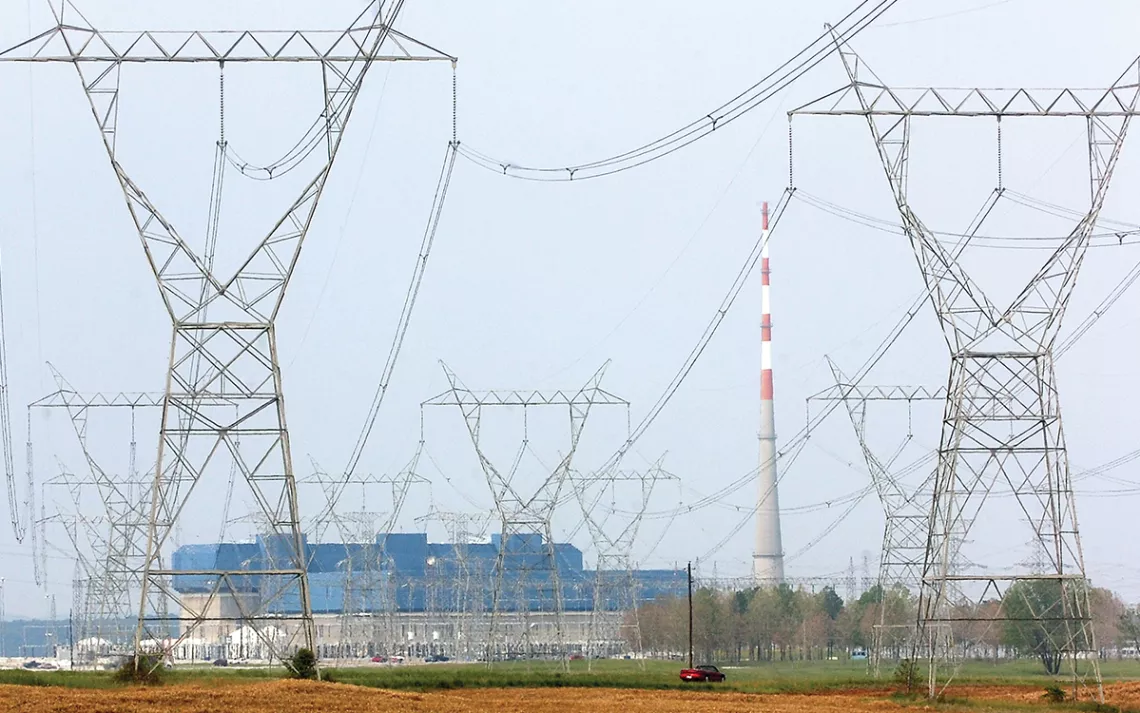TVA Reaches an Inflection Point
In the past three months, the company has issued rolling blackouts, invested in gas plants, and blown up three smokestacks without adequate public preparation

The Tennessee Valley Authority's Browns Ferry nuclear plant in Athens, Alabama. | Photo by Gary Lloyd/AP Photo/The Decatur Daily
On December 23, two days before Christmas, the Tennessee Valley Authority—a federal power company serving 10 million customers across seven states—ordered rolling blackouts after temperatures plummeted to single digits and energy demands soared.
In Memphis, state representative Justin J. Pearson said that while he was minorly impacted by the blackouts, his neighbors in the predominantly Black and low-income neighborhood of Westwood lost heat and light for hours on end. One neighbor, in her mid-forties, told Pearson that if a friend hadn’t found her a hotel, she would have died from exposure.
After one Tennessee lawmaker proposed a resolution requiring the utility to address energy issues before impending weather events, the Tennessee legislature demanded a full report, and last week, TVA officials responded: They told state lawmakers their breakdown in energy generation was largely the result of frozen instruments at natural gas plants and the Cumberland coal plant.
TVA spokesperson Scott Brooks said in an email to Sierra that the power company was “conducting a comprehensive review to understand what happened and why,” adding that “since the storm, TVA employees had identified and completed over 200 near-term actions to improve resilience and performance in advance of the next event.”
In an email, Southern Environmental Law Center attorney Amanda Garcia wrote that while the blackouts were “caused by failures at the federal utility's gas and coal plants,” TVA is still “recklessly choosing to double down on new gas plants and pipelines, making the utility even more reliant on fossil fuel technology of the past.”
The rolling blackouts— which took place almost 14 years to the date of the infamous Kingston coal ash spill—could be an inflection point for the nation’s only public power company. TVA was founded in 1933; since the 1990s, it has tacked further toward privatization and today operates much like a multibillion-dollar corporation, though without adequate oversight, critics contend. TVA’s president and chief executive officer, Jeff Lyash, earns $10 million annually and is the nation’s highest-paid federal employee. Lyash retains decision-making power over the public power company’s massive energy transitions.
“We know the failure of infrastructure is a problem,” said Pearson. “We don’t need to be building new infrastructure like gas plants but renewables like solar power and other forms that are accessible to us, particularly with the Inflation Reduction Act.”
The $370 billion package, passed in August, has so lowered the cost of renewables that now 99 percent of US coal plants are more expensive to run than solar or wind replacements, according to a new report by think tank Energy Innovation. But instead of overhauling its energy portfolio, TVA is doubling down on fossil fuels, such as its decision in January to transition its retiring Cumberland coal plant, located outside Nashville, to a 1,450-megawatt natural gas plant.
The decision isn’t popular. The City of Nashville, the local power company Nashville Electric Services, and Congress had pushed TVA to invest in renewables instead. Four days before the announcement of the gas plant decision, the EPA wrote TVA with “substantial” concerns over its plan for gas, instead recommending the integration of renewables like wind and solar and investment in energy-efficiency projects. While TVA argued that a solar array and battery storage would be too expensive and take too long to build, the EPA pointed out that TVA’s own analysis showed a savings of $3 billion over the 30-year lifespan of the solar project.
But last week, the EPA relented, declining any further challenges to the plan. The agency told The Associated Press it “determined that there were practical and achievable actions TVA could do within its Record of Decision, as well as with future actions, to improve environmental outcomes while meeting its need to retire the Cumberland coal plant.” Brooks told Sierra the solar option was more expensive and required more land than the gas option, stating, “Natural gas is the only mature technology available today that can be in operation to provide firm, dispatchable power by 2026, when the first Cumberland unit retires.”
But Pearson disagrees. “We know things are going to get worse, and instead of saying, 'What do we do to be proactive?,' they’re contributing more to the exact problem of climate change,” Pearson said. “The people who are harmed the most are Black people, lower-income people, poorer people, so their policies literally harm the most vulnerable communities. That’s not a good neighbor or operating business model.”
Now, the decision to further invest in natural gas could rest in the hands of six new board members, who joined TVA just days after the Cumberland decision was made. At least a third of these new members, who met for the first time this week in Mussel Shoals, Alabama, have advocated for clean energy alternatives in the past. Pearson hopes the new members put a renewed focus on renewable energy, but he was concerned that the previous board had granted Lyash too much power to operate without board input, including final say over what to do with retiring coal plants and far-reaching authority over new programs and incentives, including the build-out of a small modular reactor near Oak Ridge.
According to Garcia, these multimillion-dollar projects are funded through a captive customer base. Since 2019, TVA has signed new, virtually never-ending contacts with 147 of its 153 local power companies. In 2020, the Southern Environmental Law Center represented three plaintiffs in a lawsuit alleging TVA’s new contracts—which require a 20-year renewal notice and are renewed every year—were illegal under the TVA Act and failed to go through the federal regulatory review process required by the National Environmental Protect Act for projects causing environmental change.
But in January, a Memphis judge overturned the lawsuit after finding no violations to the National Environmental Protection Act and citing a lack of “imminent, environmental injury” to the plaintiffs. The judge added that the plaintiffs' allegations were resolvable by Congress, not the courts.
Garcia, who represents the plaintiffs, wrote in an email that while they’re disappointed in the court ruling, stating the contracts make it “essentially impossible for TVA customers to have meaningful negotiations with the federal utility,” they’re considering other options moving forward.
Instead of litigation, Congress could step in and remove barriers, beyond the contracts, that lock utilities into TVA’s service area. In September, Representative Steve Cohen (D) of Memphis introduced the TVA Reform and Consumer Protection Act asking Congress to tear down TVA’s “Fence”—established over 50 years ago to prevent TVA from selling electricity beyond its 1957 service area—and allow outside power companies to compete with the company. Right now, TVA is the only US power provider exempt from open-access transmission policies created by the Federal Energy Regulatory Commission in 1996.
“Ratepayers deserve the benefits—lower costs and cleaner energy—that a competitive electricity market will provide,” said Cohen in a statement, adding TVA’s current service model is “outdated” and “badly needs reform.”
In response, TVA told Sierra, “We appreciate Congressman Cohen’s continued interest in TVA and the Tennessee Valley Public Power Model,” adding, “The facts show we are fulfilling [our] mission today and are committed to evolving with the needs of the region to continue to serve future generations.”
After a very public and years-long negotiation process, TVA’s largest customer chose not to sign a 20-year rolling contract. In early December, Memphis Light, Gas and Water voted to re-sign a five-year contract with TVA, forgoing a 3.1 percent cut to its base rates, and the flexibility to produce up to 5 percent of electricity outside of TVA. Garcia was pleased by the Memphis decision, writing that it allowed the local utility to “push the federal utility to invest in cleaner and cheaper power as well as energy-efficiency programs that can lower bills for families facing some of the highest energy burdens in the country.”
Then, in early February, TVA blew up three 400-foot smokestacks containing coal ash and other coal-generation residuals in Pearson’s South Memphis neighborhood. Pearson said they sent no mailers, made no phone calls, and notified local officials less than 24 hours earlier.
TVA told Sierra they notified emergency officials, elected officials, news media, and neighbors closest to the plant, citing a Daily Memphian story published less than 24 hours prior to the implosion. The company did not include a timeline for when those activities took place.
“The lack of information leads to exploitation, and that’s TVA’s model,” insisted Pearson. “People will resist you polluting their water and damaging their lungs, and they don’t want resistance, so instead of engaging the public meaningfully, they reduce the amount of information the public has access to.”
Pearson went to the Allen site hours after the smokestacks imploded. In a live video, Pearson claimed that the Allen plant, along with TVA’s transportation of toxic coal ash into southwest Memphis, was polluting the community and contributing to their cancer risk at four times the national average and a shorter life expectancy than in neighboring communities.
“They [TVA] don’t center the community at all. They’re only centering themselves and their own profit motives,” Pearson told me. “They say, 'We aren’t a corporation,' but they operate exactly as a corporation would in the exact same manner and use the guise of being a public federal agency to obfuscate the real harm they’re doing to people.”
 The Magazine of The Sierra Club
The Magazine of The Sierra Club



